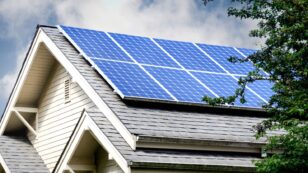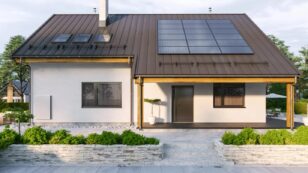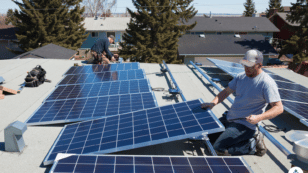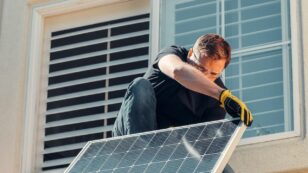
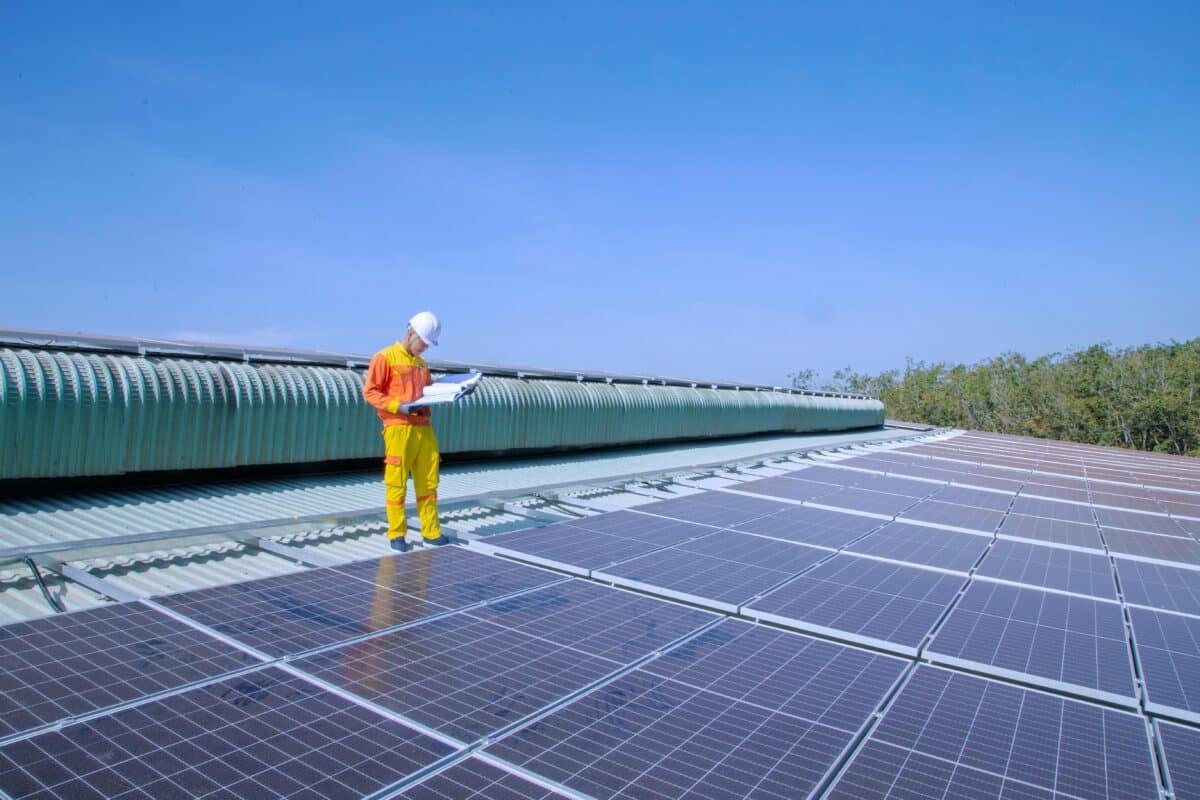
Commercial Solar Panel Installations (Costs, Benefits & More)
In this guide, we’ll answer the following:
- How many solar panels are needed for a commercial building?
- What is the price of a commercial solar panel?
- How to size a commercial solar system?
Each product and or company featured here has been independently selected by the writer. You can learn more about our review methodology here. If you make a purchase using the links included, we may earn commission.
What Does a Commercial Solar Panel Installation Look Like?
Commercial solar energy systems vary much more in size and scope than their residential counterparts. Most commercial solar arrays are much larger, and they aren’t always confined to roofs. Some organizations opt for solar carports, while others install ground-mounted solar panels.
Larger commercial operations may even feature a “power tower,” an array of mirrors that focus the sun’s rays onto the photovoltaic panels below them. Commercial systems are usually installed on a flat surface and must be built on racks tilted toward the sun at the best angle for the solar panels to capture the most energy during the day.
Some systems even include features that synchronize the panels’ angles (or azimuth) with the changing height of the sun. Keeping the cost per panel as low as possible is key to securing the quickest return on investment (ROI) for larger commercial installations.
For this reason, we recommend selecting the most efficient solar panels available. The less space, products and planning needed, the lower the aggregate costs of the installation will be. More efficient solar panels also tend to last longer, ensuring a reliable investment.
Solar offers commercial property owners a growing number of solutions to offsetting a large chunk, or even all, of a business’s electricity bill. A commercial solar system is a sizable investment, but solar incentives, tax breaks and new technologies make it a very attractive one.

Blue Raven Solar

Regional Service
Average cost
Pros
- Industry-leading in-house financing
- Competitive pricing
- Excellent reputation
Cons
- Doesn't offer solar batteries (coming 2022)
SunPower designs and installs industry-leading residential solar and storage solutions across all 50 states. With a storied history of innovation dating back to 1985, no other company on this list can match SunPower’s experience and expertise.
SunPower earns its position as the top national installer on our list for a handful of reasons: It installs the most efficient solar technology on the residential market, offers the most expansive service area and backs its installations with a warranty well above the industry standard. All the while, SunPower pioneers sustainability efforts within the industry.
If that weren’t enough, SunPower systems come packaged with products all manufactured in-house by its sister company, Maxeon. This means that your panels, solar cells, inverters, battery and EV chargers are designed to work together and are all covered under the same warranty.
SunPower’s biggest downside? Its high-efficiency panels are considerably more expensive than most of its competitors’ products. However, its powerful panels are workhorses that make up for the initial cost with more backend production (think about this like spending more money for a car that gets more miles per gallon).
Facts and Figures: Blue Raven Solar
| EcoWatch Rating |
|---|
| Better Business Bureau (BBB) Rating |
| Year Founded |
| Average Cost ($-$$$$$) |
| Solar Services |
| Brands of Solar Equipment Offered |
| Warranty Coverage |
| 4.5 |
| A+ |
| 2014 |
| $$ |
| Solar Panels, System Monitoring |
| Trina Solar, Canadian Solar, SolarEdge, Silfab, SunPower |
| 25-year manufacturer warranty; 10-year workmanship warranty, 2-year production guarantee |

Blue Raven Solar

Regional Service
Average cost
Pros
- Industry-leading in-house financing
- Competitive pricing
- Excellent reputation
Cons
- Doesn't offer solar batteries (coming 2022)
We like Blue Raven Solar because it understands that, for most homeowners, the cost of solar presents the biggest barrier to entry.
For that reason, Blue Raven Solar developed an innovative solar financing plan that offers in-house, flexible, zero-money-down options. The results speak for themselves, as Blue Raven Solar is now one of the fastest-growing solar companies in the nation and was recently acquired by SunPower. Its BluePower Plus+ plan (exclusive to Blue Raven) mimics the flexible structure of a lease while still providing the greatest benefits of owning your system.
Eligible homeowners enjoy 18 months of solar power before having to pay their first bill. When coupled with the federal solar investment tax credit (ITC), the initial energy savings can offset more than a third of the overall cost of a system before requiring a dollar down.
In contrast, other installers can only offer similar financing through solar leases, PPAs or third-party providers (such as Mosaic or Sunlight). Third-party loan providers can complicate the process, while opting for a loan or PPA will disqualify you from some of solar’s biggest benefits (additional property value, federal solar tax credit and local solar incentives).
Facts and Figures: Blue Raven Solar
| EcoWatch Rating |
|---|
| Better Business Bureau (BBB) Rating |
| Year Founded |
| Average Cost ($-$$$$$) |
| Solar Services |
| Brands of Solar Equipment Offered |
| Warranty Coverage |
| 4.5 |
| A+ |
| 2014 |
| $$ |
| Solar Panels, System Monitoring |
| Trina Solar, Canadian Solar, SolarEdge, Silfab, SunPower |
| 25-year manufacturer warranty; 10-year workmanship warranty, 2-year production guarantee |
Commercial Solar Costs
Given the size of commercial solar projects, customers can usually expect a larger figure than the cost of most residential systems. No two businesses are the same, and though some small organizations may find great value in a commercial system costing around $50,000, large industrial facilities or solar farms can cost over $1 million to install.
The good news is that as the scale of the system increases, so does the speed at which you can recoup your investment. Several tax credits, rebates and incentives still exist for commercial solar panel systems as they do for residential systems.
| Incentive | Benefit for Commercial Solar Panel Installations |
| Federal solar tax credit | The federal solar investment tax credit (ITC) allows the deduction of 30% of the cost of the system for any commercial solar installation. |
| Bonus depreciation through MACRS | The Modified Accelerated Cost Recovery system (MACRS) allows a tax deduction for the depreciation of qualifying solar equipment. This solar tax incentive for commercial installations allows companies to recover their investments over an accelerated amount of time, provided the system is installed prior to January 1st 2027. For solar, this accelerated timeline is five years. Bonus depreciation was introduced into MACRS after 2008 and allows you to allocate 100% of the depreciable value in just one year. In other words, MACRS allows businesses to effectively accelerate their ROI through tax deductions. |
| Net metering | Commercial properties generating energy via solar panels are eligible for net energy metering (NEM). In the same way that a residential customer would feed excess solar energy back to the grid, commercial installations can exchange their surplus energy for credits from their utility company. These credits can be used to pull energy from the grid overnight or during rainy weather at no cost. Net metering is declining across the country, though, so current savings from this perk could go down in the near future. |
| Statewide and local incentives | We encourage our readers to research statewide incentives or local incentives that may be available in their area. Depending on the area, a commercial solar installation could be eligible for solar rebates, renewable energy credits or zero-interest solar loans. |
The ideal way to get a good understanding of what the best solar installation price for your business is to consult with a local installer near you to get a quote, which you can do for free below.
Benefits of Commercial Solar Installations
Commercial solar installations provide all the same benefits that residential solar installations do, only at a much larger scale. As most commercial solar installations can be well over 50 kW (the average residential is around 9 kW, and most systems sit between 5 and 10 kW), some commercial solar installations can have over 10 times the environmental and economic impact of your average residential installation.
Environmental Benefits of Commercial Solar Panels
Commercial solar installations have the potential to offset hundreds, if not thousands, of the metric tons of carbon dioxide emitted by conventional energy generation. For example, a 50-kW commercial system will produce an estimated 65,000 kWh of clean energy per year.
This would lower a business’s carbon footprint by 1,000 metric tons over the course of a commercial solar power system’s lifetime (the equivalent of not burning just over 1 million lbs of coal). As a growing number of consumers are choosing to support businesses with responsible environmental practices, solar presents businesses with a golden opportunity to reflect their commitment to sustainability while still turning a profit.
Financial Benefits of Commercial Solar Panels
Energy costs are routinely one of the highest costs to businesses. Energy Star reports that the nation’s small businesses spend over $60 billion on energy per year, and utility rates are only projected to increase over time. Utility rates also fluctuate with frequent supply disruptions, so investing in solar allows businesses to offset their energy costs in a predictable, fixed manner.
The average lifetime of a solar panel is around 25 years, so with the right warranty, a business can reliably budget their energy costs decades in advance. By offsetting the majority (or sometimes all) of their energy costs, businesses can reinvest huge sums of money back into their organizations, raising their bottom line.
The ideal way to get a good understanding of what the best solar installation price for your business is to consult with a local installer near you to get a quote, which you can do for free below.
FAQ: Commercial Solar Panel Installations
Installing solar panels is one of the best financial investments a business can make. Assuming they have the proper space and climate for solar panels, businesses can offset huge chunks of their energy costs while fostering an ethical image. With a good number of soon-to-expire commercial incentives on the market today, there has never been a better time for businesses to invest in solar.
Commercial solar installations are typically much larger than residential installations, so they can have a more intensive install process. Depending on the size of the system, commercial solar panel installations can take anywhere from weeks to months to complete. The best way to learn how long an installation would take for your business is to connect with a local solar installer near you.
The number of solar panels necessary for an installation will depend mainly on the goals of the installation and how much space is available for panels. Though some commercial solar operations like solar farms exist to generate and sell energy for profit, most businesses only aim to offset their own energy costs. That means they won’t need to buy as many panels as they can fit, but only the amount necessary to meet their energy needs. The best method to determine exactly how many panels you’ll need for your home to meet your energy needs is to contact a local solar installer for a free proposal.
Absolutely. Commercial and industrial solar installations can sometimes offer even more value than residential solar panels. Due to the scale of most commercial installations, price-per-watt is cheaper, giving customers much more bang for their buck. Commercial installations still maintain eligibility for the solar tax credit, net metering and certain tax deductions, making it a savvy investment for business owners.
Comparing authorized solar partners
-
- Industry-leading in-house financing
- Competitive pricing
- Excellent reputation
- Doesn't offer solar batteries (coming 2022)
A+Best Solar Financing2014Trina Solar, Canadian Solar, SolarEdge, Silfab, SunPower25-year manufacturer warranty; 10-year workmanship warranty, 2-year production guarantee
Having trouble deciding? Click below and use our process to receive multiple quotes instead:

 233k
233k  41k
41k  Subscribe
Subscribe 




